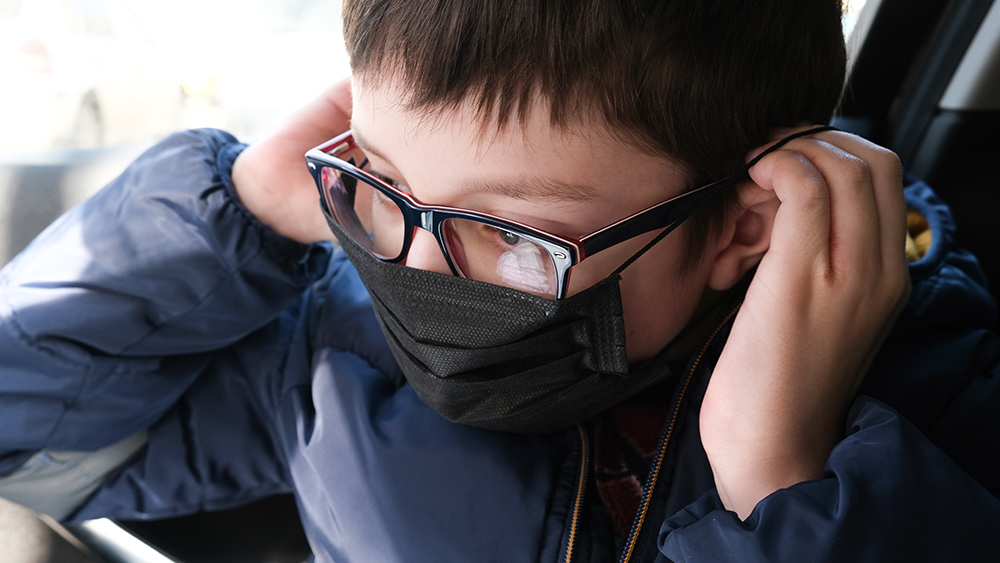Experts warn impact of coronavirus pandemic on children’s mental health is “increasingly alarming”
04/20/2021 / By Zoey Sky

Health experts are concerned about the effect of the coronavirus (COVID-19) pandemic on the mental health of the general population, particularly the children. According to health experts, children are some of the most affected by the pandemic because of the repeated lockdowns and the sudden and significant changes in everyone’s lifestyle.
Governments have enforced lockdowns or heavily restricted movements to try and stop the spread of the COVID-19 pandemic. These rules have changed life for everyone, with people stuck at home and often isolated away from their friends and loved ones.
While isolation is already a problem during normal times, being alone during the pandemic can significantly worsen an individual’s overall well-being. (Related: Extended coronavirus lockdowns having severe negative effect on mental health of children – report.)
Health experts are most concerned about the children, who aren’t as emotionally mature to deal with changes like remote schooling for months and being away from their friends for so long. The pandemic has also been linked to “grave mental health consequences” and an “international epidemic” of suicide among children.
In a telephone interview with the Associated Press, Dr. David Greenhorn from the emergency department at England’s Bradford Royal Infirmary said that he is particularly concerned about the suicide attempts, that have gone up from two per week pre-pandemic to several cases every day.
Health experts report more suicide attempts and cases of self-harm in young patients
After months of starving himself, 11-year-old Pablo’s heartbeat has slowed and his kidneys were failing. His parents were worried and they were barely in time for their son to receive fluids and be fed through a tube.
Jerome, who agreed to discuss his son’s illness, asked that they not be identified by their surname. He is torn by the pain of seeing Pablo “destroying himself,” shared Jerome, Pablo’s father.
Pablo is only one among many young patients that health experts are treating at the Robert Debré Hospital, the busiest in France. The Paris pediatric hospital where his parents took Pablo has recorded twice the number of children and young teenagers requiring treatment after attempted suicides since September 2020.
Doctors in other countries are also worried about similar surges and some children as young as eight are “deliberately running into traffic, overdosing on pills and otherwise self-harming.”
According to France’s Education Ministry, child and adolescent suicides hit record levels in 2020.
Pediatric psychiatrists are also treating children with coronavirus-related phobias, tics and eating disorders. Their young patients are constantly overthinking about infections, scrubbing their hands raw to prevent illness, with some even covering their bodies with disinfectant gel. Other children are also scared of getting sick after eating infected food.
Doctors have also recorded cases of children experiencing debilitating symptoms of mental anguish like panic attacks and heart palpitations. There are also young patients showing signs of chronic addictions to mobile devices and computer screens since these devices are often used to teach or entertain students during lockdowns and school closures.
Dr. Richard Delorme, head of the psychiatric unit treating Pablo at the Robert Debré Hospital, explained that there is “no prototype for the child experiencing difficulties.” The declining mental health of children across the globe concerns everyone, from parents to health experts, added Delorme.
Jerome is still trying to understand why his son developed a chronic eating disorder amid the pandemic. Pablo slowly starved himself to the point that he would only consume small quantities of rice, tuna and cherry tomatoes.
Disruptions to Pablo’s routines in 2020 might have contributed to his illness, Jerome thought. Pablo switched to remote schooling for most of last year as France went on lockdown.
The boy didn’t have a chance to say goodbye properly to his friends and teacher at the end of the school year. “This is a generation that has taken a beating,” commented Jerome.
Considered “the world’s worst health crisis in a century,” the coronavirus has claimed millions of lives all over the globe. But remote learning and isolation because of the pandemic isn’t the only thing that’s been affecting Pablo.
Back in 2015, Islamic State extremists killed 130 people in gun and bomb attacks across Paris. One such attack occurred at a cafe that Pablo passes by on his way to school. The incidents left a mark on his childhood, and Pablo used to believe that the cafe’s dead customers were buried under the sidewalk that he passed by every day.
Pablo lost a third of his previous weight when he was hospitalized at the end of February. Medics struggled to find a pulse because his heart rate was so slow and one of his kidneys was failing because of his refusal to eat.
Dr. Coline Stordeur, Pablo’s psychiatrist at Robert Debré Hospital, said that some of her other young patients with eating disorders are aged eight to 12. These patients started worrying about gaining weight while on lockdown because they couldn’t stay active.
One boy started running laps in his parents’ basement for hours each day until he lost so much weight that he had to be hospitalized. Stordeur’s other patients restricted their diet by making small changes at first, like not consuming sugar or fat until they stopped eating anything.
Children are unable to speak about their struggles
Stordeur explained that some children try to keep their mental anguish to themselves to avoid causing more problems for the adults in their lives who may also be mourning loved ones or job loss because of coronavirus. They may “try to be children who are forgotten about, who don’t add to their parents’ problems.”
Others may struggle because they “lack the vocabulary of mental illness” to ask for help and to connect their problems with the coronavirus pandemic. Children don’t usually say they reached their breaking point because of the pandemic.
Instead, children often tell Delorme that they miss their old routines or that they no longer have the drive or energy to pursue their hobbies. Young patients also talk about having trouble going to school in the mornings. Others are also tired of having to wear masks.
Greenhorn added that the emergency department at the Bradford Royal Infirmary used to treat one or two children per week for mental health emergencies, such as suicide attempts. But because of the coronavirus pandemic, the average is now one or two per day, with patients as young as eight.
Greenhorn warned that things will only get worse if this “international epidemic” among children isn’t addressed immediately. The pandemic and the lockdowns may be particularly hard for children since one year may seem like a very long time for them.
According to Delorme, the psychiatric unit at Robert Debré Hospital usually recorded 20 attempted suicide cases per month involving children aged 15 or younger. But because of the pandemic, that number has doubled in some months since September. Delorme was troubled because some patients as young as nine have “a genuine wish to end their lives.”
Like adults, the stress levels of children have also skyrocketed during the pandemic. Health experts like Delorme were urging people to check in on loved ones both young and old since the pandemic affects everyone.
Sources include:
Tagged Under: Anxiety, children's health, coronavirus, coronavirus lockdown, covid-19, lockdown, loneliness, mental health, outbreak, pandemic, Psychology, suicide, suicide attempts, virus
RECENT NEWS & ARTICLES
COPYRIGHT © 2017 DEPRESSIONSYMPTOMS.NEWS
All content posted on this site is protected under Free Speech. DepressionSymptoms.news is not responsible for content written by contributing authors. The information on this site is provided for educational and entertainment purposes only. It is not intended as a substitute for professional advice of any kind. DepressionSymptoms.news assumes no responsibility for the use or misuse of this material. All trademarks, registered trademarks and service marks mentioned on this site are the property of their respective owners.




















